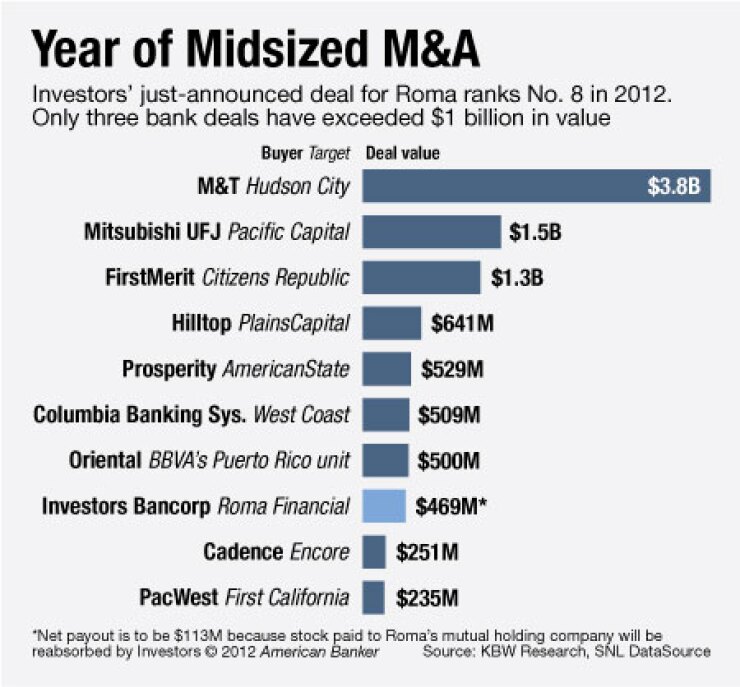-
Investors Bancorp of Short Hills, N.J., has agreed to buy Roma Financial Corp. of Robbinsville, N.J. The deal, scheduled to close in the second quarter, would bring together two mutual thrifts and create a company with assets of more than $13 billion.
December 20 -
Roma Financial Corp. (ROMA) said that one of its banks has entered into a written agreement with the Office of the Comptroller of the Currency.
September 28 -
Kevin Cummings makes our list of Community Bankers to Watch as his New Jersey mutual thrift mulls a second-step conversion and possible acquisitions around New York.
December 17

For Investors Bancorp (ISBC), it's a race against the clock to gobble up as many mutual holding companies as possible, like Roma Financial (ROMA), before Investors converts to a fully stock-owned company.
Except in this race, Investors has the luxury to keep moving the finish line.
Once Investors completes its second-step conversion, it would be legally barred from acquiring another mutual. That limitation may invite Investors to acquire as many mutuals as it can afford, before it converts, says Horwitz & Associates analyst Ted Kovaleff.
"I wouldn't be surprised to see Investors remain in the MHC mode a little bit longer, because there are a couple of other nice mutual holding companies that would strengthen their footprint," he says.
The speculation began Thursday, less than a day after Investors, of Short Hills, N.J.,
Credit quality and compliance issues have troubled Roma recently. The Office of the Comptroller of the Currency
After Chief Executive
Enter Investors, stage left. One of Roma's attractions is that it will give Investors its first physical retail presence in the Philadelphia suburbs of central New Jersey.
Roma will also provide a big boost to Investors' long-planned second-step conversion. Without the Roma acquisition, Investors would probably raise between $900 million and $1.1 billion in a conversion next year, Domenick Cama, chief operating officer, said during a Thursday conference call. With Roma, the conversion would raise an additional $275 million to $325 million.
That "is the beauty of this transaction," Cama said.
Roma's mutual holding company owned about 75% of the company's outstanding stock, as of March 14. Roma, founded in 1920 by Italian immigrants, completed its first-step conversion to a partially stock-owned company in January 2005. Inverso did not return a call seeking comment.
Analysts on the call quizzed Cama and Kevin Cummings, Investors' president and chief executive, about the prospect for more deals before its conversion. Sterne Agee analyst Matt Kelley asked Cama and Cummings to handicap the possibility of doing another acquisition before the second-step conversion.
"It's very difficult to convince another [mutual holding company] to merge with us," Cama said in response. "Going the MHC route is a way to maintain control."
In an interview this month with American Banker, Cummings said he's
"Really, your stars have to be aligned," Cummings said in the interview, which took place before the Roma deal was announced.
Special circumstances surrounded Investors' previous deals for mutuals.
Investors will now most likely target MSB Financial (MSBF), a $347 million-asset mutual thrift, Kovaleff says. MSB is especially attractive because it has a "stranglehold" on Millington, N.J., an affluent community in northern New Jersey.
Magyar Bancorp (MGYR), a $528 million-asset thrift in New Brunswick, N.J., could also be targeted, although it has "a good number of questionable assets," says Kovaleff, who owns shares in Investors, Magyar and MSB Financial.
Michael Shriner, president and chief executive of MSB, and Magyar's president and chief executive, John Fitzgerald, did not return calls seeking comment.
Mutual thrifts that are not publicly traded would also be appealing to Investors, including $4.7 billion-asset Columbia Bank of Fair Lawn, N.J., or $1.6 billion-asset Union County Savings Bank of Elizabeth, N.J., Kovaleff says. But they are unlikely to want to make a deal, because neither has yet sold shares to the public in a first-step conversion, and that's a perk that most mutuals want to keep.
The timing of Investors' deal surprised some people, who had expected Investors to be focused on its second-step conversion, and not on making another acquisition.
"People were expecting them to do a second-step conversion sooner, rather than later," says KBW analyst Damon DelMonte. "I was expecting them to be done [with the conversion] by summer."
DelMonte, during the conference call, asked if the Roma deal would postpone the conversion.
Cummings responded, "This is just a great opportunity to use the MHC structure and we're on our plan to move forward" with the conversion.





